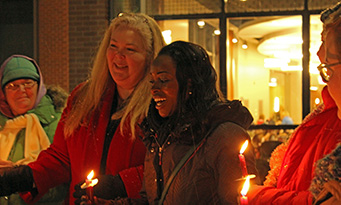Faith in Action Ending Slavery
Judaism
Judaism is deeply connected to the themes of slavery and freedom. The Torah instructs in Deuteronomy 24:18: “Remember that you were a slave in Egypt and that the Lord your God redeemed you from there. Therefore, I command you to do [justice].” The enslavement of Jews during biblical times—and their exodus—form a central narrative not only for Jewish people but for others who have found hope in the biblical story.
Passover:
Each year, the Passover Project provides an array of readings, lesson plans, and activities for Passover (see below), while also choosing a specific social action focus for the Jewish community during the Festival of Freedom.
Passover Project Video: Perfect to play at Zoom Seders or Jewish education classes, this five-minute video includes survivors describing modern slavery in their own words. Download here.
Passover Prep Flyer: Join the Jewish community in supporting slavery survivors and amplifying their voices. Protect the vulnerable, keep people free, and provide dignity and resources, “for you know the soul of a stranger, having been strangers in the land of Egypt” (Exodus 23:9).
What can Jews do in 10 hours, 10 minutes, or even 10 seconds to remember and help slaves this Passover? This one-page handout has suggestions for action. It outlines the root causes of slavery and solutions developed by Free the Slaves.
Passover Coupons: These “coupons” can be printed and distributed at your Seder to inspire conversation and t’zedakah (charity) during—and beyond—the holiday.
Seder Starters: A compilation of readings and activities at-the-ready for your Seder.
About the Passover Project
The Free the Slaves Passover Project is a year-round campaign to enlist Jewish schools, congregations, and communities into a network mobilized against human trafficking. The goal is to inspire Jews to join the battle against modern slavery throughout the year. The Passover Project has four key objectives:
- Making education about modern slavery a part of congregational life
- Mobilizing Jewish communities to take strong advocacy stands against modern slavery
- Inspiring synagogues, Jewish schools and other Jewish institutions to be careful consumers and investors to be sure the products they buy or the companies in which they invest aren’t tainted by slavery
- Making support for Free the Slaves a part of school t’zedakah projects and an option for b’nai mitzvah projects
Learn more here
Contact Free the Slaves to join: info@freetheslaves.net
Next Year, Free! A Modern Slavery Curriculum
Free the Slaves has collaborated with Rabbi Debra Orenstein, Rabbi Erin Hirsh and master educators from the different Jewish movements in the creation of teaching materials on modern slavery from a Jewish perspective. This state-of-the-art curriculum includes material for every age from kindergarten through adulthood. View online. Click here for a webinar recording about how to use Next Year, Free!
Shabbat: “That they may rest as well as you.”
“Free Your Shabbat!” is both a flyer and a mission. One page outlines the problem of modern slavery and strategic solutions Free the Slaves is implementing. The second page provides ideas for what you can do to enhance Shabbat and simultaneously help end slavery. Click here to Download or View Online.
Hanukah: Another Festival of Freedom
Download our “Free Your Hanukkah” handout for suggestions on what you can do in 10 seconds to 10 hours to help create awareness and end modern slavery.
For more ways to increase freedom this Hanukkah, check out our Freedom and Hanukkah flyer. | View Online
Christianity
Christian abolitionism took root in the 17th century. In England, prominent Anglicans joined forces with Quakers, Baptists, Presbyterians, Methodists, Congregationalists, and other faith groups to form the world’s first anti-slavery movement.
Together they built a moral consensus to ban the trans-Atlantic slave trade and then outlaw slavery itself throughout the British Empire.
Religion had been used in the past to justify slavery. But today, Christians worldwide regard it as immoral and unjust.
- The epistles of St. Paul condemned slave traders and called for slaves to be treated as “brethren.”
- Quakers believed that everyone, including African-American slaves, was “equal in the sight of God.”
- Men and women of faith often led slave revolts on colonial plantations, and many revolts occurred during Christian festivals.
- In the 1800s Quakers and other religious groups assisted the Underground Railroad, helping thousands of slaves to escape.
For more information on putting your faith into action, download Sundays Against Slavery.
“If there is one abuse that offends our conscience in every way, it is the enslavement of a human being. No child should be born without hope; no person should live without freedom.” –Desmond Tutu, Archbishop Emeritus, Cape Town, South Africa
Islam
Muslim voices have called for the abolition of slavery since ancient times.
The Prophet Muhammad declared: “There are three categories of people against whom I shall myself be a plaintiff on the Day of Judgment. Of these three, one is he who enslave a free man, then sells him and eats this money.”
The Quran teaches that all people are equal, like the teeth in a comb.
- Sura 90 in the Quran states that the righteous path involves “the freeing of slaves.”
- In the 1800s, Muslim jurists in India concluded it was improper to kidnap Africans and transport them to other countries as slaves.
- Adopted by 54 countries in the 1980s, the Cairo Declaration on Human Rights in Islam takes a definitive stand against slavery, stating that “human beings are born free, and no one has the right to enslave, humiliate, oppress or exploit them, and there can be no subjugation but to God the Most High.”
For more information on putting your faith into action, download Muslims Against Slavery.
Hinduism
Most Hindus live in India, where slavery has been historically intertwined with the caste system. Varna religious tradition dictates that the dirtiest and most difficult work in Hindu society is relegated to “untouchables”—making many Indians even today vulnerable to slavery.
During the struggle to liberate India from British colonialism in the 1900s, Mahatma Gandhi said: “The moment the slave resolves that he will no longer be a slave, his fetters fail. He frees himself and shows the way to others.”
- Early reformers drew on an understanding of Hinduism that saw the caste system as a means of control used by elites to dominate and exploit others, rather than as an integral component of Hindu faith.
- In the 1980s, laws in southern Indian states ended devadasi, a traditional practice where lower-caste girls are forced into sex slavery in Hindu temples.
- In 1976 Hindu activists helped convince the Indian government to ban bonded labor slavery.
- India’s current constitution outlaws caste-based discrimination.
For more information on putting your faith into action, download Resources for Hindus.
Buddhism
The Buddhist belief in karma and reincarnation has been used to justify slavery, reasoning that a person’s enslavement must be a result of punishable actions in a previous life. But the eight-fold path of Buddhist beliefs actually teaches explicitly against the trade in living beings.
In fact, the Chinese Emperor Wang Mang, a Buddhist, may have been history’s first powerful abolitionist—he outlawed the slave trade in 9 A.D.
- Buddha’s “Discourse to Sigala” in the Sigalovada Sutta states that an employer should care for workers by paying just wages, providing health care, and granting leave time.
- Buddhist temples have often served as safe-havens for escaped slaves.
- The holistic tradition of mindfulness encourages Buddhist faithful to ask if they benefit from slavery and slave-tainted products, even if they aren’t personally involved in trafficking and slavery.
For more information about putting your faith into action, download Resources for Buddhists.
“Brute force, no matter how strongly applied, can never subdue the basic human desire for freedom. Peace can only last where human rights are respected, where the people are fed, and where individual and nations are free.” –The Dalai Lama
Baha’i Faith
The Baha’i sacred writings explicitly prohibit slavery, stating: “It is forbidden you to trade in slaves, be they men or women. It is not for him who is himself a servant to buy another of God’s servants, and this hath been prohibited in His Holy Tablet.”
Baha’u’llah, the prophet-founder of the Baha’i Faith, lived in nineteenth-century Persia and was born into a family that held slaves. In 1839, at age 22, he inherited his father’s slaves and freed them. Years later, after founding the Baha’i Faith, he wrote a tablet (formal letter) to Queen Victoria of Britain in which, among other things, he praised her abolition of slavery: “We have been informed that thou hast forbidden the trading in slaves, both men and women. This, verily, is what God hath enjoined in this wondrous Revelation. God hath, truly, destined a reward for thee, because of this.”
Every Baha’i is called upon to be “an upholder and defender of the victim of oppression,” and the teachings of the Baha’i Faith strongly emphasize the promotion of equality, justice and unity. One passage from the Baha’i writings states: “O Children of Men! Know ye not why We created you all from the same dust? That no one should exalt himself over the other.”
For more information on putting faith into action, download Baha’i Resources on Human Trafficking and Modern-Day Slavery.







